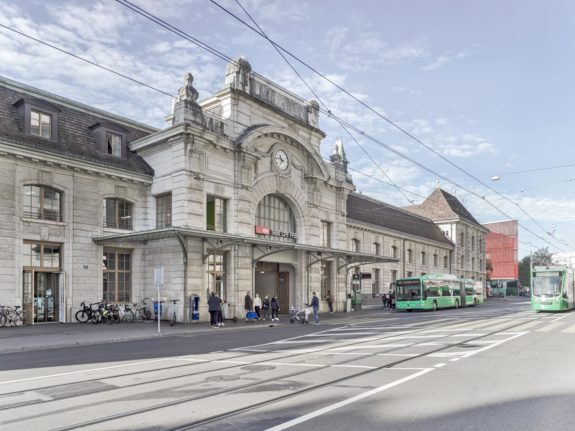“The construction work will lead to train cancellations, changed travel times and connections,” the company, SBB, said on its website.
Not being able to rely on Switzerland’s (usually very reliable) rail system will surely be a headache for commuters living, or transiting through, one of the country’s busiest train stations.
But it may be reassuring to know that the “the aim of these projects is to increase train connections and ensure that train services continue to be safe and punctual,” SBB said.
What exactly is being ‘improved’?
“The expansion projects will enable quarter-hourly service on the S-Bahn between Basel and Liestal and half-hourly service on long-distance services on the Basel–Delémont–Biel/Bienne line by the end of 2025,” SBB said. “At the same time, maintenance projects are carried out to ensure safe and punctual train services.”
In all, a total of around 1.7 billion francs will be invested in the infrastructure in the Basel area for expansion projects. There are also extensive maintenance projects, such as the basic repair of the Hauenstein base tunnel, for 140 million francs.
Which services will be disrupted, and when?
Travelers in the Basel area will be particularly affected on the weekend from March 16th to 18th, 2024.
According to SBB, construction will take place at Basel SBB train station, in Muttenz, in Laufental and in Fricktal. Construction work is also taking place across the border on French and German territory.
Timetable restrictions from March 13th, 2024 in Fricktal
On the Basel–Frick–Brugg AG–Zurich HB route there will be adjustments to the timetable from March 13th to June 24th and from August 11th to November 8th, 2024 due to the renovation of the Mühlebach Bridge.
The InterRegio trains are temporarily canceled between Rheinfelden and Frick, and replacement buses run between Möhlin and Stein-Säckingen instead of the S1.
Basel–Olten: timetable restrictions at night and on weekends
The SBB is completely renovating the Hauenstein Base Tunnel on the Basel–Olten railway line – one of the main axes of Swiss passenger and freight transport.
That’s why the timetable will be adjusted from Sunday to Thursday evening from 10 pm throughout the 2024 timetable year.
From Sunday evening, July 7th, to Monday morning, August 12th, 2024, one of the two tunnel tracks will also be closed. From mid-November, the tunnel will be completely closed for four weekends. The single-track closure and the total closures lead to travel time adjustments, diversions and train cancellations with replacements.
Laufental: timetable restrictions at night and on weekends
So that the long-distance trains Basel–Laufen–Delémont–Biel/Bienne can run every half hour in the future, the SBB is expanding the railway line between Grellingen and Duggingen to double track. As a result, the route must be closed on several weekends and nights between January 19th and October 7th, 2024, and replacement buses will run.
Where can you find further information about the disruptions?
Through your SBB app, or online at this link, which is updated in real time.



 Please whitelist us to continue reading.
Please whitelist us to continue reading.
Member comments